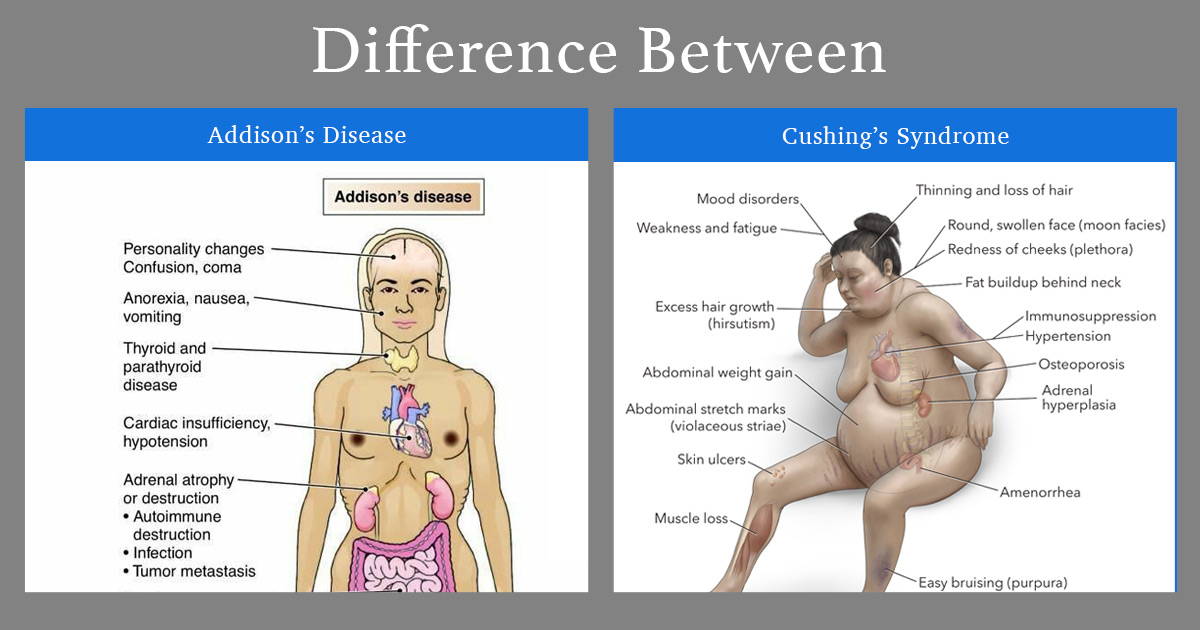What’s the Difference Between Addison’s Disease and Cushing’s Syndrome?

Ever heard of adrenal glands? They’re tiny organs above your kidneys that manage hormones like cortisol and aldosterone, crucial for stress, metabolism, and even blood pressure. But what happens when these glands aren’t doing their job right? That’s where conditions like Addison’s disease and Cushing’s syndrome come in.
Think of them as two sides of the same coin. Addison’s disease happens when your adrenal glands don’t make enough hormones, while Cushing’s syndrome occurs when they go into overdrive and produce too much. Even though they’re opposites, both can cause serious symptoms that mess with your quality of life.
Symptoms of Addison’s vs. Cushing’s
The symptoms of these conditions couldn’t be more different, and recognizing them is key to figuring out what’s going on.
Addison’s Disease Symptoms
When your body isn’t making enough cortisol or aldosterone, these are the kinds of things you might notice:
- Extreme fatigue that doesn’t go away
- Unexplained weight loss
- Craving salt (a lot!)
- Feeling dizzy or faint, especially when you stand up
- Darkening skin, often on scars or skin folds like your knuckles
- Nausea, low blood sugar, and even mood changes
These symptoms can sneak up on you slowly, which often makes Addison’s disease hard to catch early.
Cushing’s Syndrome Symptoms
Too much cortisol paints a completely different picture. People with Cushing’s syndrome often have these issues:
- Weight gain, especially around the face (called “moon face”) and stomach
- Thinning skin that bruises easily
- Purple stretch marks, often on the belly or thighs
- Muscle weakness and fatigue
- A fatty hump between the shoulders
- High blood pressure and sometimes blood sugar issues
Cushing’s doesn’t just change how you feel inside; it can change how you look on the outside too, which can be tough emotionally.
What’s Causing These Conditions?
The root of both Addison’s and Cushing’s lies in a hormone imbalance, but why that imbalance happens is very different.
Addison’s Disease Causes
Most cases of Addison’s disease (around 70–90%) are caused by an autoimmune reaction where your body attacks its own adrenal glands. But that’s not the only potential trigger. Things like tuberculosis, certain medications, or even adrenal gland surgery can leave your body unable to produce enough hormones.
Cushing’s Syndrome Causes
Cushing’s syndrome is often linked to steroid medications used to treat things like asthma or arthritis. If it’s not caused by meds, tumors in the adrenal or pituitary glands can end up pushing your body to overproduce cortisol.
The causes may differ, but in both cases, hormones are at the center of the puzzle.
How Are Addison’s Disease and Cushing’s Syndrome Different?
The core difference comes down to hormones. Addison’s disease means your adrenal glands are underperforming, so you don’t have enough cortisol (and sometimes aldosterone). Cushing’s syndrome, on the other hand, means an overproduction of cortisol.
This hormone imbalance explains why the symptoms are almost opposites. Addison’s makes you lose weight, feel weak, and crave salt, while Cushing’s makes you gain weight, feel weak, and deal with stretch marks and high blood pressure.
Treating Addison’s vs. Cushing’s
The treatment for each condition starts with restoring balance to those hormone levels.
Managing Addison’s Disease
For Addison’s disease, long-term hormone replacement therapy is the go-to solution. Medications like hydrocortisone or prednisone can help replace cortisol, while fludrocortisone is used for aldosterone. If you have low sodium levels, your doctor might even recommend upping your salt intake to avoid dehydration and dizziness.
An adrenal crisis, which happens when Addison’s symptoms spike suddenly, is a medical emergency requiring immediate attention with IV medications and fluids.
Treating Cushing’s Syndrome
Treatment for Cushing’s syndrome depends on what’s causing the excess cortisol. For many, cutting back on corticosteroid medication (gradually, under a doctor’s supervision) solves the problem. If the issue stems from a tumor, surgery to remove it is typically the next step, followed by radiation or medications that block cortisol production if needed.
Regular follow-ups and hormone monitoring are vital for both conditions to ensure the treatment is working.
Clearing Up Misconceptions
A common question is, “Does Addison’s disease cause weight gain?” The answer is no. People with Addison’s actually tend to lose weight because their low hormone levels disrupt appetite and metabolism. On the flip side, weight gain is a hallmark of Cushing’s syndrome, so understanding these differences helps clear up confusion.
Is Prevention Possible?
Addison’s disease is usually tied to autoimmune conditions, so it’s not something you can always prevent. However, staying on top of your overall health and tracking any unusual symptoms early can help.
When it comes to Cushing’s syndrome, prevention is often about responsible use of corticosteroid medications. Don’t use them longer or in higher doses than prescribed, and ask your doctor about alternatives if you’re concerned.
Take Charge: Your Health Starts with Awareness
Your adrenal glands might be tiny, but they hold the power to affect so much of your body. Understanding conditions like Addison’s disease and Cushing’s syndrome is an important step toward taking care of your health.
These two conditions are a fascinating reminder of how every system in our body is so interconnected. From sudden fatigue to strange stretch marks, subtle symptoms might point to something bigger. If you’re dealing with unexplained weight changes, long-term tiredness, or anything else unusual, don’t ignore it. Call your doctor, ask questions, and take charge of your health—I personally think your body’s best advocate is you!
